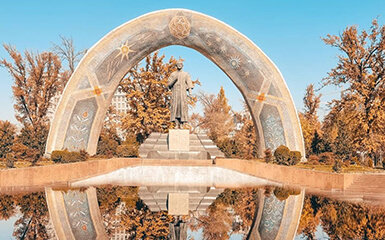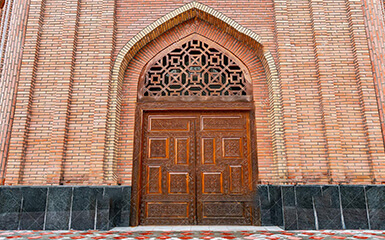Kok Gumbaz
Ajina Teppa
Ancient Panjakent
Anzob Tunnel
Beshkent Qala
Childukhtaron
Khazrati Shokh
Mug Teppa
Gharm Chashma
Hisor Historical
Haji Yaqub mosque
Hazrati-Bobo complex
Lake Iskanderkul
Kalai-Khumb
Karatag
Karon
Khishtin caravanserai
Khorog
Khulbuk
Lake Karakul
Abdullatif Sultan
Madrasai Kuhna
Abu Abdullah Rudaki
Khoja Mashhad
Khudoyor Valami
Makhmudi Azam
Mir Sayyid Ali Hamadani
Muhammed Bashoro
Sheikh Muslihiddin
Nurek Mountain Lake
Pamir
Sarazm
Sari-Khosor
Seven Lakes
Shirkent
Chiluchorchashma
Takht-i Sangin
Mausoleum of Abu Abdullah Rudaki

Abdullah Jafar Ibni Mohammed Rudaki is a Persian (Iranian) poet. Known as the first great genius of modern Persian, he composed poems in the Perso-Arabic alphabet. He is the founder of classical Persian literature. His very eclectic work embraces a number of ancient Persian poetic genres, notably the quatrain. Only a few fragments of his writings have survived.
He was born in Rudak, a village near Samarkand in Transoxiana, in what is now Panjakent, in present-day Tajikistan. Many of his biographers claim that he was totally blind, but his knowledge of colours in his poems makes this claim very doubtful. Russian anthropologist Mikhail Guerassimov hypothesizes that he was blinded only towards the end of his life for his opposition to the ruler.
Rudaki has an extremely eclectic work with eulogies, funeral laments and even love lyricism. His style is simple and fluent, an important feature of the Khorasan school. He is also credited with inventing the rubai, a Persian poetic measure close to the Western quatrain. He would also put the verses of Kalila and Dimna, a famous collection of oriental fables. Most of his work, estimated at around 100,000 lines, is now lost.
About 40 miles outside of the city of Panjakent, there is a serenity, a sanctity given by the shrine's remote location. The gravel road to Rudaki's resting place is rocky and bumpy, and even though the shrine was built in 1958, Panjrud villagers still stare in amazement at the sight of foreigners and tourists.
The mausoleum is behind carved wooden doors that surround a large, well-maintained, bright green garden filled with roses. On the door is one of the most famous lines of the poet, written by Rudaki in the 10th century, and it is said:
There is no greater joy in this world
Than seeing the faces of friends
Inside, the surrounding walls and marble floors are pristine, shimmering, almost idyllic white, with holes in the ceiling shining natural light onto the dark marble coffin that stands in the middle of the mausoleum. Downhill from Rudaki's resting place, there is a small museum displaying artefacts from Rudaki's life and the history of the Sughd region, as well as a library of numerous translations and editions of works by Rudaki and other Persian poets.

